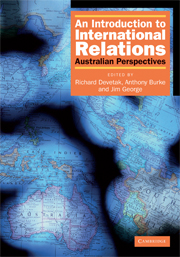Book contents
- Frontmatter
- Contents
- List of tables, figures and boxes
- List of contributors
- Preface and acknowledgments
- An introduction to international relations: the origins and changing agendas of a discipline
- 1 Theory and practice in Australian international relations: the search for identity and security
- Part 1 Theories of international relations
- Part 2 The traditional agenda: states, war and law
- Part 3 The new agenda: globalisation and global governance
- 20 Multilateral economic institutions
- 21 Global trade
- 22 Global finance
- 23 Non-state actors: multinational corporations and international non-governmental organisations
- 24 Global poverty and inequality
- 25 Globalisation and its critics
- 26 The globalisation of Islam
- 27 Global terrorism
- 28 Humanitarianism and armed intervention
- 29 Human rights
- 30 Migration and refugees
- 31 Global environmental politics
- 32 Global governance and the United Nations
- Glossary of terms
- Bibliography
- Index
- References
27 - Global terrorism
from Part 3 - The new agenda: globalisation and global governance
- Frontmatter
- Contents
- List of tables, figures and boxes
- List of contributors
- Preface and acknowledgments
- An introduction to international relations: the origins and changing agendas of a discipline
- 1 Theory and practice in Australian international relations: the search for identity and security
- Part 1 Theories of international relations
- Part 2 The traditional agenda: states, war and law
- Part 3 The new agenda: globalisation and global governance
- 20 Multilateral economic institutions
- 21 Global trade
- 22 Global finance
- 23 Non-state actors: multinational corporations and international non-governmental organisations
- 24 Global poverty and inequality
- 25 Globalisation and its critics
- 26 The globalisation of Islam
- 27 Global terrorism
- 28 Humanitarianism and armed intervention
- 29 Human rights
- 30 Migration and refugees
- 31 Global environmental politics
- 32 Global governance and the United Nations
- Glossary of terms
- Bibliography
- Index
- References
Summary
Introduction
This chapter provides an overview and analysis of global terrorism. Its main argument is that any understanding of terrorism must come to terms with its global root causes. The first part emphasises the importance of locating terrorism in its social and historical context if it is to be properly understood. The second, whilst acknowledging the contested nature of terrorism, offers a working definition of what terrorism is. The third addresses some of the reasons why terrorism is such a controversial subject. The fourth elaborates how terrorism has been transformed under conditions of globalisation. The final part clears up some misconceptions surrounding terrorism's root causes.
Contemporary terrorism in context
More than five years after the tragedy of 11 September 2001 and President Bush's declaration of the ‘war on terror’, the threat of terrorism is more pervasive than ever. Since September 11, attacks have occurred against commercial and civilian targets across a diverse terrain including Britain, Jordan, India, Indonesia, the Philippines, Russia, Saudi Arabia, Spain and Turkey. At the same time, although they have not attracted as much attention, less spectacular terrorist strikes have imposed similarly serious economic, social and psychological costs on communities in sub-Saharan Africa and in Central and South America. The net effect of this pattern of violence has been a steady supply of media-friendly outrages that have kept terrorism at the forefront of the Western imagination and turned counter-terrorism into a new organising principle within domestic and international politics (see Table 27.1).
- Type
- Chapter
- Information
- An Introduction to International RelationsAustralian Perspectives, pp. 318 - 328Publisher: Cambridge University PressPrint publication year: 2007



